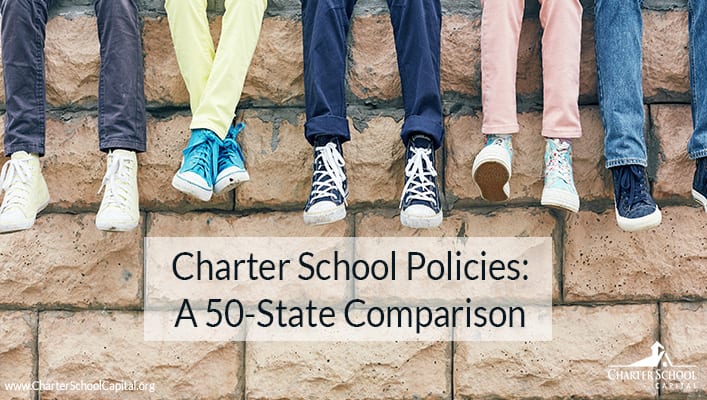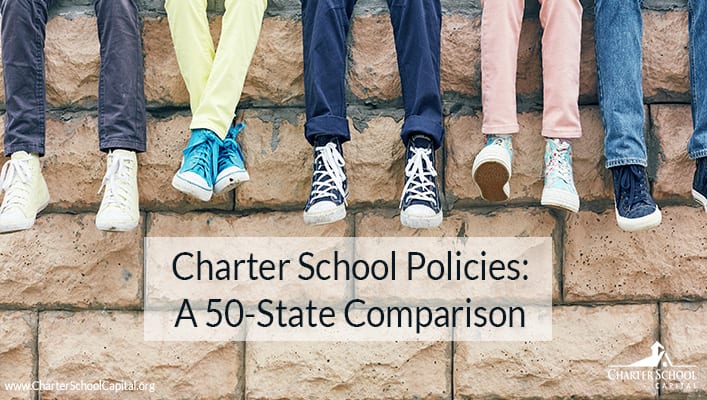
Charter School Policy: A 50-State Comparison
Editor’s Note: This is a great resource on charter school policy that was published on January 20, 2020. It is from the Education Commission of the States and compares charter school policies and how they align or differ across the 50 states. Education Commission of the States is the trusted source for comprehensive knowledge and unbiased resources on education policy issues ranging from early learning through postsecondary education.
We think it’s vital to keep tabs on the pulse of all things related to charter schools, including informational resources, and how to support school choice, charter school growth, and the advancement of the charter school movement as a whole. We hope you find this—and any other article we curate—both interesting and valuable.
50-State Comparison: Charter School Policies
Charter schools are semi-autonomous public schools that receive public funds. They operate under a written contract with a state, district or other entity (referred to as an authorizer or sponsor). This contract — or charter — details how the school will be organized and managed, what students will be expected to achieve, and how success will be measured. Many charter schools are exempt from a variety of laws and regulations affecting other public schools if they continue to meet the terms of their charters.
Charter school laws vary from state to state and often differ on several important factors, such as who may authorize charter schools, how authorizers and charter schools are held accountable for student outcomes, and whether charter school teachers must be certified.
Currently, 45 states and the District of Columbia have charter school laws. West Virginia’s charter school laws, created in 2019, are the newest.
Education Commission of the States has researched charter school policies in all 50 states to provide this comprehensive resource, updated January 2020. Click on the questions below for 50-State Comparisons, showing how all states approach specific charter school policies. Or view a specific state’s approach by going to the individual state profiles page.
50-State Comparisons
Charter School Basics
- Does the state have a charter school law?
- Does the state allow existing public schools to convert to charter schools?
- Does the state have any caps on the number of charter schools?
- Does the state specify the students who may be given enrollment preference?
- Does the state specify who must provide transportation to charter school students?
Charter School Applications
- Who may apply to open a charter school?
- Does the state specify the types of charter schools that may be given approval preference?
- Does state law explicitly state that charter school operators or management companies be for-profit or nonprofit organizations?
- Does the state have provisions specific to high-performing charter schools, including replication of high-performing charter schools?
Charter School Authorizing
- What organizations may authorize charter schools, and is there a statewide authorizing body?
- Is there an appeals process for charter applicants?
- Does the state require the authorizer to report on the performance of its portfolio of schools?
- Are there sanctions in place for authorizers?
Charter School Autonomy and Accountability
- What rules are waived for charter schools?
- Does the state specify grounds for terminating or not renewing a school’s charter?
- Does state policy include provisions for charter school closures?
Charter School Funding
- How is the funding for a charter school determined?
- Who provides charter schools with their funding?
- Does the state provide startup or planning grants to new charter schools?
- What kind of facilities funding is available to charter schools?
Charter School Teachers
- Do teachers in a charter school have to be certified?
- Does the state require school districts to grant teachers a leave of absence to teach in a charter school?
Virtual Charter Schools
- Does state law explicitly allow virtual charter schools?
- Is there a statewide authorizer specific for virtual charter schools?
- Does the state set enrollment limits for virtual charter schools?
- Is there additional oversight specific to virtual charter schools?
Related Resources
- Recent state legislation – Charter Schools. Education Commission of the States staff review state legislation and regulations weekly to keep this resource updated.
- Key Issue: School Choice
- Charter Authorizers: What they are & why they matter
- School Choice Glossary
 Since the company’s inception in 2007, Charter School Capital has been committed to the success of charter schools. We help schools access, leverage, and sustain the resources charter schools need to thrive, allowing them to focus on what matters most – educating students. Our depth of experience working with charter school leaders and our knowledge of how to address charter school financial and operational needs have allowed us to provide over $2 billion in support of 600 charter schools that have educated over 1,027,000 students across the country. For more information on how we can support your charter school, contact us. We’d love to work with you!
Since the company’s inception in 2007, Charter School Capital has been committed to the success of charter schools. We help schools access, leverage, and sustain the resources charter schools need to thrive, allowing them to focus on what matters most – educating students. Our depth of experience working with charter school leaders and our knowledge of how to address charter school financial and operational needs have allowed us to provide over $2 billion in support of 600 charter schools that have educated over 1,027,000 students across the country. For more information on how we can support your charter school, contact us. We’d love to work with you!
